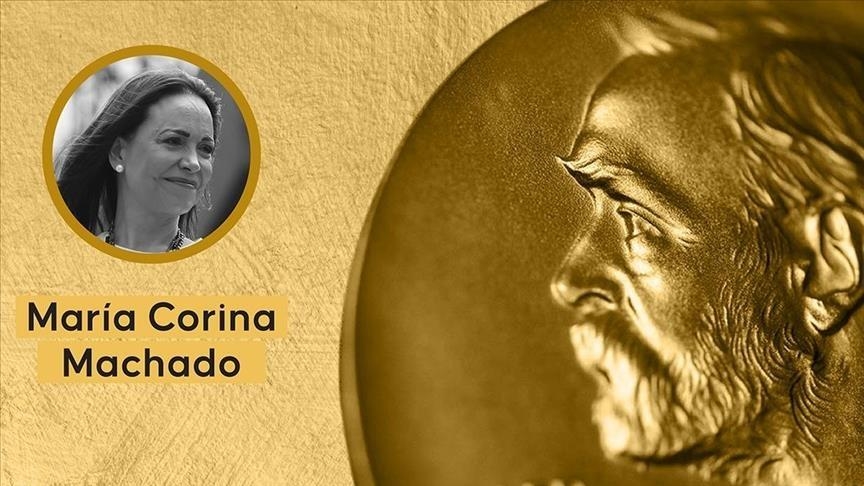Latin America divided over Venezuelan opposition leader's Nobel Peace Prize
Leaders in Latin America have mixed reactions to María Corina Machado's receiving prestigious award

MEXICO CITY
The Nobel Peace Prize being awarded to Venezuelan opposition leader María Corina Machado on Friday drew mixed reactions in Latin America, with some leaders offering praise, strong condemnation by others Mexico choosing to remain silent.
The announcement of the award had some pointing to her past rhetoric and actions, which was characterized as violent or supportive of foreign intervention.
President Claudia Sheinbaum from Mexico refrained from commenting on Corina's award during a news conference. Instead, the Mexican leader called for respect of national sovereignty.
"We have always stood for sovereignty and the self-determination of peoples, not just out of conviction but because our Constitution demands it, and I’ll leave it at that," said Sheinbaum.
Former Bolivian leader Evo Morales was among the fiercer critics of Corina, taking to social media to register his condemnation.
"Awarding the Nobel Peace Prize to someone who has promoted repression, military intervention in her own country, and coups d'état is not only immoral — it encourages the use of violence as a means to violate human rights, democracy, and the peaceful exercise of civic life," he said.
Cuban President Miguel Diaz-Canel, a strong ally of Venezuelan President Nicolas Maduro, blasted the newly-crowned peace laureate with a series of posts on the US social media platform, X, as he voiced support for Maduro and denounced the Nobel Committee.
"It is shameful to grant this award in 2025 to a person who has called for military intervention in her homeland, and who in past years encouraged street protests where people were burned alive," he wrote. "We strongly reject this political maneuver that seeks to single out #Venezuela and undermine its Bolivarian leadership, headed by its legitimate President, Nicolás Maduro Moros.”
The reactions from Bolivia and Cuba, along with Sheinbaum, illustrate how Machado’s political stance and role as opposition leader to Maduro have not gone unnoticed in the region.
As an opposition leader, currently living in hiding following Venezuela’s 2024 elections, Machado has openly called on the international community to intervene in Venezuela to topple Maduro. In 2018, she sent a letter to Israeli Prime Minister Benjamin Netanyahu, requesting his "expertise and influence."
Machado appealed to various countries in the letter that asked for help to bring about regime change in Venezuela, and emphasized that it would "necessarily involve the strengthening of international security."
But not all responses in Latin America were negative. Several heads of state expressed strong support for Machado and praised the Nobel Committee’s decision.
Panamanian President Josu Raúl Mulino celebrated on behalf of Panama and its people.
"Without a doubt, this is recognition of her peaceful struggle on behalf of a people fighting for their freedom. A great victory!” he wrote on X.
Guatemalan President Bernardo Arévalo commended Machado’s career and said the prize reflects her courageous role as an opposition figure. "The Nobel Peace Prize is a well-deserved recognition of your personal struggle, courage, and determination in defending democracy and human rights in Venezuela. Through you, the importance of fighting for democratic values, freedom, and human dignity is acknowledged worldwide.”
President Santiago Pena in Paraguay congratulated Machado for her efforts and pledged his country's continued support. “Congratulations @MariaCorinaYA on this well-deserved Nobel Peace Prize. It is a just recognition of your daily fight for democracy in Venezuela. From Paraguay, we will continue supporting you so that this dream may finally come true.”
Anadolu Agency website contains only a portion of the news stories offered to subscribers in the AA News Broadcasting System (HAS), and in summarized form. Please contact us for subscription options.






